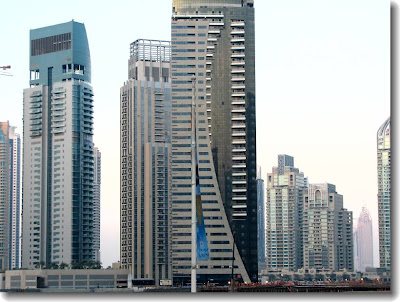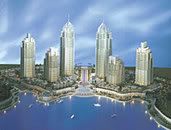Dubai Booms
Dubai Rides the Oil Boom, writes US News & World Report. It is a long read and quite interesting, even for those who are already familiar with the many Dubai clichés.
Dubai's iconic sail-shaped Burj Al Arab hotel..., the article begins in rather predictable tones. However, it goes on to cover a broader scope of topics, skirts the anti-cliché of Dubai as poster child for labor exploitation and offers some fresh commentary. Below is my selection of the more interesting comments:
This, along with an incredible openness to taking input from outsiders at all levels, is key to what is happening in Dubai. Huge shipping ports, huge airports, massive investments in road and bridge construction, a new metro being constructed in record time, waterways being dug up through the desert... Dubai, post 1970, has never hesitated with regard to infrastructure development.
Dubai is, even its tiny geographical scope, not so dissimilar from China and India as a new, powerful force behind the economic activity which will in effect define the world's 21st century economy. In this sense comparisons to New York and Hong Kong are in order. One may wonder what happens when the price of oil declines or the real estate bubble bursts. But one must understand further that there is not likely to be any reduction in economic growth in the world's two largest emerging economies, China and India. It is not this that the high oil price feeds, and the wealth from it which pours into Dubai and the Gulf will continue to fuel both an investment and population boom which should continue to support growth in real estate development.
In any event, Dubai is not a single or double industry success story. It has emerged as a highly diversified economy--somewhat like the US, albeit on a much smaller scale. Today, its key industries are trade, shipping and transport, oil (as a recipient of oil wealth investment), tourism, construction and real estate, gold and commodities and retail sales. It is rapidly expanding into numerous other industries including media, production and publishing, health care, education, etc. Left on the horizon are industries like manufacturing (let's not be surprised to hear someday of Dubai's venture into automobile or aircraft manufacturing), nuclear energy production, space tourism, marine engineering, etc.
Perhaps a bit of fantasy has taken over the better part of my imagination when it comes to what Dubai is able to achieve, however, if there were ever any place at anytime that had the potential to do all these things, Dubai stands as perhaps the best candidate in the 21st century, alongside much larger India and China.
Go to DM Blog latest posts, Dubai Marina Communities or MAG 218 Community homepage.
Dubai's iconic sail-shaped Burj Al Arab hotel..., the article begins in rather predictable tones. However, it goes on to cover a broader scope of topics, skirts the anti-cliché of Dubai as poster child for labor exploitation and offers some fresh commentary. Below is my selection of the more interesting comments:
- ...beneath the one-upmanship, there is a far more serious transformation, one that is turning Dubai into the business, financial, and perhaps tourist center of a newly invigorated Persian Gulf region.
- Indeed, this unprecedented wealth transfer is starting to rewrite the fundamental balance of power in the world economy...
- Dubai has successfully turned itself into a post-oil economy that feeds in part on the oil wealth of its neighbors, who have been happily investing in the city's red-hot real estate market.
- Dubai's ruler, Sheik Mohammed bin Rashid al-Maktoum, has set out a vision for something that has never been done before—building a world-class city on a par with New York or Hong Kong...
- "There is a lot of glitz and glamor, but the core element of Dubai's development plan has always been infrastructure," says Aamir Rehman, author of Dubai & Co.: Global Strategies for Doing Business in the Gulf States.
- "If you take 1 percent of the wealthiest cream of the crop, that's 10 million people worth at least $5 to $10 million," says Frank Khoie, a property developer. "They can leave their countries, which are not clean, organized, and safe, and come to a new America—the UAE.
- "People keep coming here, but after six months, they are tired of the life," he says. "If you have money, this country is for you. If you don't have money, you cannot have a good life."
- Dubai's laborers could be vulnerable to radicalization, and there is also the risk of homegrown extremism. "Terrorism is the big elephant in the room that no one wants to discuss," says Christopher Davidson, a professor at Britain's Durham University...
- Dubai has managed to shrug off most of the traditional factors that held other regional economies back—inept bureaucracies, suffocating state control, bans on foreign ownership of land or companies, and prohibitions on nightclubs or liquor.
- Dubai has always welcomed outsiders, says Sheika Lubna al Qasimi, the UAE minister of foreign trade. "Here, you have an environment built for them,"...
...the core element of Dubai's development plan has always been infrastructure.
This, along with an incredible openness to taking input from outsiders at all levels, is key to what is happening in Dubai. Huge shipping ports, huge airports, massive investments in road and bridge construction, a new metro being constructed in record time, waterways being dug up through the desert... Dubai, post 1970, has never hesitated with regard to infrastructure development.
Dubai is, even its tiny geographical scope, not so dissimilar from China and India as a new, powerful force behind the economic activity which will in effect define the world's 21st century economy. In this sense comparisons to New York and Hong Kong are in order. One may wonder what happens when the price of oil declines or the real estate bubble bursts. But one must understand further that there is not likely to be any reduction in economic growth in the world's two largest emerging economies, China and India. It is not this that the high oil price feeds, and the wealth from it which pours into Dubai and the Gulf will continue to fuel both an investment and population boom which should continue to support growth in real estate development.
In any event, Dubai is not a single or double industry success story. It has emerged as a highly diversified economy--somewhat like the US, albeit on a much smaller scale. Today, its key industries are trade, shipping and transport, oil (as a recipient of oil wealth investment), tourism, construction and real estate, gold and commodities and retail sales. It is rapidly expanding into numerous other industries including media, production and publishing, health care, education, etc. Left on the horizon are industries like manufacturing (let's not be surprised to hear someday of Dubai's venture into automobile or aircraft manufacturing), nuclear energy production, space tourism, marine engineering, etc.
Perhaps a bit of fantasy has taken over the better part of my imagination when it comes to what Dubai is able to achieve, however, if there were ever any place at anytime that had the potential to do all these things, Dubai stands as perhaps the best candidate in the 21st century, alongside much larger India and China.
Go to DM Blog latest posts, Dubai Marina Communities or MAG 218 Community homepage.
Labels: dubai success








